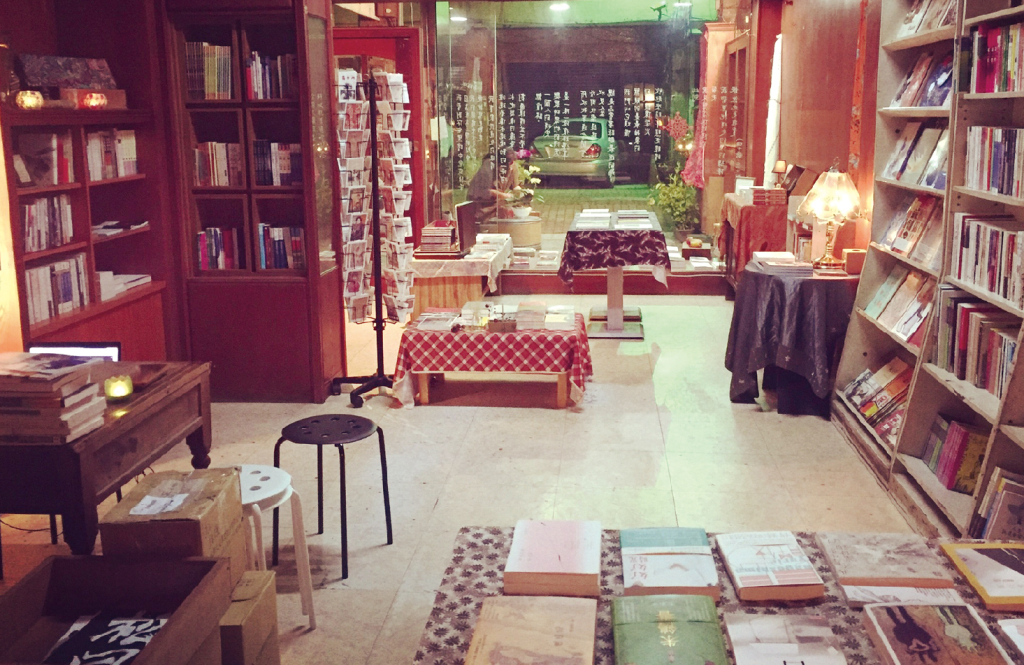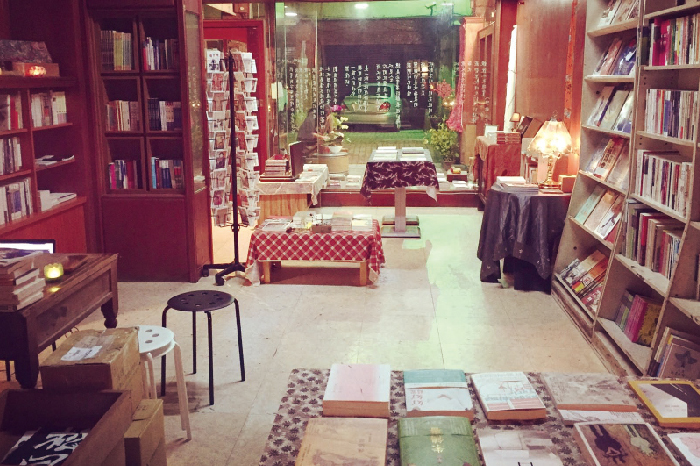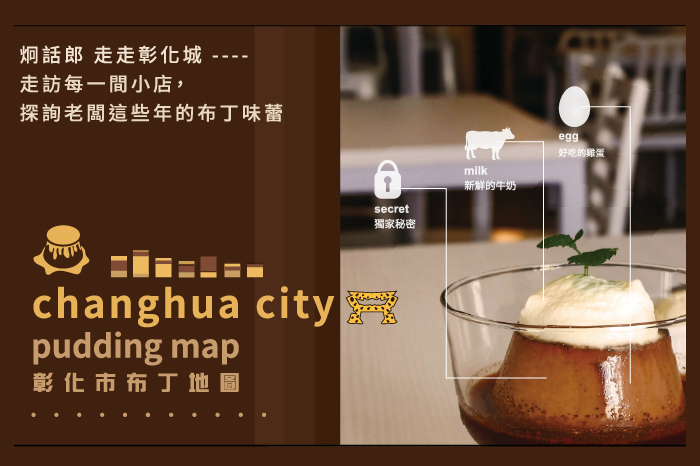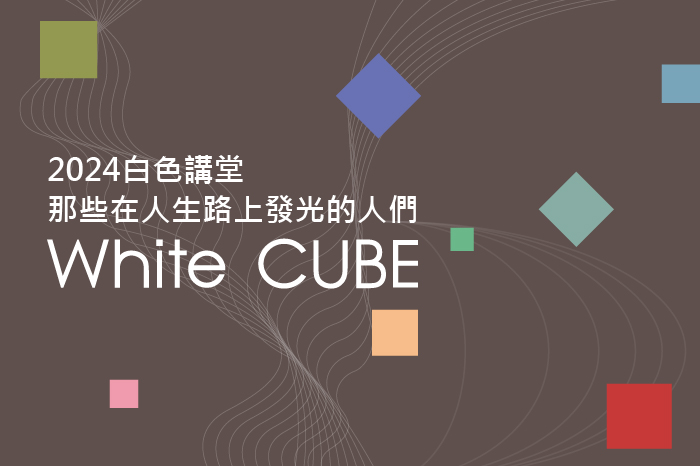紅絲線 text apartment
蜿蜒的城市,更適合思索。通往書店的路徑,即是獨立思考的過程。
文/黃書萍 照片提供/紅絲線
04 728 3360 紅絲線
彰化市城中街20號
No.20, Chengzhong St., Changhua City, Changhua County 500, Taiwan
還記得白色方塊2015年七、八月間,一直聽說彰化有間獨立書店要開了,爾後與賴和基金會夥伴幾次會議上,大家也不約而同提到獨立書店-店老闆Emily,當時一直沒能一睹真面目;幾次的錯過,當正式見面後才曉得,原來Emily已經到過白色方塊、原來在2015年7月在彰化節孝祠也遇上了Emily的講座…原來生活的連結,就像絲與線,無形間讓我們成了一個網絡。


Q1-1:是什麼樣的機會讓你開店?
Emily:
2012那年3月11日,是日本311地震&海嘯發生的時候,發生的當下,覺得人生無常,人在異鄉,想要回家鄉做的事情都還沒做,看著眼下,從事房地產文案、企劃工作,總是寫著「公園景觀第一排、藍天白雲在你家」,事不宜遲,不需要等到存夠錢的一天才做,而且台北永遠沒有存夠錢的一天;因此當時就決定回家,回到彰化,享受自然的鄉村,農田就在我家旁、抬頭就是藍天…
Q1-2回到彰化也就是開店的開始嗎?
Emily:
一開始回到彰化並沒有開店的打算,當時在台中的文化出版公司工作,主要負責電子書企劃、編輯相關工作;爾後有機會參與賴和基金會所安排的課程時,接觸彰化歷史後,萌生老書店田野調查的想法,漸漸地思考起彰化的需要,慢慢的成形自己是否有創業的可能。
Q1-3:當初為何選擇城中街為書店的地址?
Emily:
當時是以火車站為軸心,想尋找街區走路、散步即可以到的距離,想讓來書店的客人可藉由步行來到書店,步行的過程心境也會伴隨走路而沉澱下來,對於進入書店是個很好的前奏曲。而城中街這位置,從中華路涵洞進到城中街這令人印象深刻的交通位置,再加上當時城中街已有咖啡店-單車旅人作為鄰居,因此覺得這位置,有著鬧中取靜的好氛圍。
Q2:關於書店的選書有什麼類別嗎?
Emily:
主要為台灣文學、社會科學、女性書寫
台灣文學包含文史、當代文學、現代詩文,而台灣文學的書類,主要也因為接觸賴和基金會,閱讀賴和文學,同時也對於台灣文協的時代、彰化文學的發展有更多深入探究,因此文學的書籍就像是這塊土地生長的基底,了解了基底,讓我們更認識現在的樣子。
社會科學的書籍,就像是台灣文學長出來的枝幹,其中這方面的書籍包含社會主義、街區發展..等類別,而書店就像是個平台,希望凝聚關心這社會發展、街區發展的人們,進而也在店內舉辦「讀書會」,讓想關心、有想法的人能把更多的能量投注在一起。
女性書寫包含女性歷史、女性人物、性別議題、女權議題..等,這方面議題的關注,跟在彰化長大的自己有關。從求學期間一直到現在,彰化對於自己是個相對保守的區域;但從歷史的角度來看,日治時期的彰化,就有婦女共勵會的創辦,以女性為主提出多項觀點的探討,例如:女性也可以鍛鍊體魄、男性也可以學縫紉…等,議題的發聲讓社會多了交流、探討。反觀現今趨向保守,讓自己更對於這領域的書籍有自我閱讀與推展的立基。
Q3:在開店的過程中,有什麼有趣的事嗎?
Emily:
去年店內舉辦歐洲魅影影展,影展後有位客人遺留了水瓶在店內,當時單純的想po上粉絲專頁,幫水瓶找到主人,就順手找了首詩來po水瓶文;遺留的客人循粉絲專頁找回了水瓶;而我也因此認識了一位寫詩的客人,客人也開始向我推薦各樣的詩文,讓自己對於詩文的書籍有更多的認識,這讓自己發現可以從讀者身上不斷學習,也是對自我以及書店的成長。
Q4:書店有為你的生活帶來什麼改變嗎?
Emily:
完全不一樣了,原本想回到彰化有更多的時間與家人相處,但反觀書店的工作時間更長,讓自己反而無法浪漫的在河堤散步、觀賞農田風光。
Q5:如果有人想來城中街開店,有什麼建議嗎?
Emily:
這是個有正能量的地方,可以允許你用微小的方式存在
訪談的最後,Emily提到,日治時期彰化有許多印刷業及書店,在中部地區的思想傳播發展上,曾發揮重要的影響,如今在彰化和平路上還留有一間「大朝社」書店,因此等書店再有力量一點,希望能做個彰化老書店探訪,記錄下屬於彰化的書店歷史。

Q1-1: What inspired you to open a bookstore?
Emily: On March 11th, 2012, an earthquake and tsunami devastated Japan. At that instance, I was reminded that nothing is permanent in life. I was living in another city, and had not gone back to my hometown to do the things I wanted to. I was engaged in real estate copy and planning back then, writing descriptions like “exclusive park view with blue sky and fluffy white clouds as your neighbors”. So I figured, it’s now or never. It is unnecessary to wait until I have enough savings, and there’s no such thing as having enough savings working in Taipei so, I decided to come home, come back to Changhua, to enjoy the natural countryside where I have farms right at the side of my house, blue sky right there whenever I look up.
Q1-2: Were you going to open a store when you first came back to Changhua?
Emily:At first, there was no such plan as becoming a store owner. I worked at a publisher in Taichung, mainly in charge of e-book planning and editing. Later on I had the chance to participate in courses arranged by Lai Ho Foundation. As I got to know about the history of Changhua, the idea of conducting a field research on old bookstores grew. Gradually, I started to think about what Changhua needs, and began to see the possibility of me being an entrepreneur.
1-3: Why did you choose to locate your bookstore on Chengzhong Street?
QEmily: I was looking for a spot that is within walking distance from the train station. I would like my customers to walk to the bookstore. The walk calms the state of mind, which is an excellent prelude to entering the bookstore. Chengzhong Street left quite an impressive on me with the culvert on Zhonghua Road as its entrance. Plus, there is already Biking16 Cafe there as my neighbor, so I think this location is a quiet spot among the city hustle and bustle with really good vibes.
Q2: What book categories do you select for the bookstore?
Emily: The main selections are Taiwanese literature, social science and women’s writing.
Taiwanese literature includes history, contemporary literature and modern poetry. Due to my acquaintance with Lai Ho Foundation, I have read Lai Ho’s literature, and learn about the Taiwanese Cultural Association and the development of literature in Changhua. Literary books are like the foundation of our land. By getting to know the basis, we can make more sense of what it’s like now.
Books about social science is a branch that derives from Taiwanese literature, which includes socialism, neighborhood development, etc. My bookstore is a platform that brings together people who care deeply about the development of our society and neighborhood. Furthermore, the book clubs I host in the bookstore integrate the energy of the minds.
Women’s writing includes history of women, female characters, gender issues, women rights issue, etc. My interest and concern in this area has to do with me growing up in Changhua. Since I was a student until now, Changhua has been a relatively conservative place in my perspective. However, from a historical viewpoint, there was the establishment of women’s association in Changhua during Japanese colonization. The association brought up several discussions specifically about women. For instance, women could train themselves for better physical capability, and men could learn sewing and tailoring. By bringing up these issues, exchanges and understanding are encouraged.
Q3. Did you encounter anything interesting in your bookstore?
Emily:Last year I hosted the Taiwan European Film Festival in my bookstore and one customer left a water bottle forgotten. I posted a message along with a poem on Text Apartment’s fan page on Facebook only to seek for its owner. Later on the owner retrieved the bottle, and I got to know a customer who writes poetry, and was recommended with a variety of poems which enhance my knowledge on poetry. This encounter made me realize that I can learn from the readers, and it adds to my personal as well as my bookstore’s development.
Q4. Did the bookstore bring any changes to your life?
Emily:My life is totally different now. I used to think that coming back to Changhua means more time spent with my family. Yet as my working hours in the bookstore prolong, I find myself hardly able to roam along the riverbank, or enjoy the scenery of farmlands.
Q5. What suggestion would you like to give if someone wants to open a store in Chengzhong Street?
Emily:This is a place of positive energy. It allows you to exist in a tiny sense.
Towards the end of the interview, Emily mentioned that during the Japanese colonial rule, there were numerous printing enterprises and bookstores in Changhua, which played a phenomenal role in spreading ideas in central Taiwan. You can still see the Da Chao She Bookstore on Heping Road that was preserved from then. Once the bookstore is more stable and well-established, she would like to visit all old bookstores in Changhua and record the history of Changhua’s bookstores.
紅絲線,正如她的名字一般,絲線是編織、縫補、也是串聯,而書、Emily、書店,三者之間也意味著彼此而成的織網。當在彰化有了這間書店,我們走在城中街一會單車旅人、一會紅絲線,文字編織出了人與人的網絡、也縫補了我們的缺少,並串聯起小店的據點,彰化有紅絲線真好。
Hung Si Xian, Text Apartment’s Chinese name, red silk thread in translation, stands for weaving, sewing and linkage, too. Books, Emily, and the bookstore, the three of them form a web. We now have this bookstore in Changhua, and we can visit both Biking16 Cafe and Text Apartment Bookstore on Chengzhong Street. Text weaves the connection between people. It also stitches to make up what we lack and links




